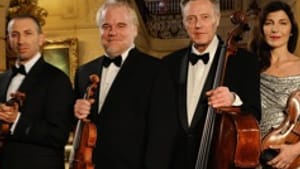Stay in the Loop
BSR publishes on a weekly schedule, with an email newsletter every Wednesday and Thursday morning. There’s no paywall, and subscribing is always free.
How do neurotic people produce such gorgeous music?
Yaron Zilberman's "A Late Quartet'

Freud, in Civilization and Its Discontents, suggested that civilized behavior is late-evolving, fragile and a very thin veneer, beneath which mankind remains lustful, savage and morally blind, like our precursors in the animal kingdom. Yaron Zilberman's 2012 film, A Late Quartet, uses the unlikely vehicle of a string quartet to illustrate this point, or something like it.
(I don't know if Zilberman intended this as his main theme, but at the very least he wanted to show that human emotions and conflicts dwell just beneath the surface of an otherwise disciplined musical ensemble.)
A similar idea was taken up on a larger scale by Fellini in his iconic 1978 film, Orchestra Rehearsal, in which a symphony orchestra devolves from a serious rehearsal situation to total chaos and mutual aggression. A Late Quartet doesn't go that far, but it does dramatize how even the finest, most dedicated musicians are flawed human beings, and that sometimes their personalities, life situations and internal conflicts disrupt their music-making.
Music and psychology
A string quartet ensemble is characterized by its polished sonority, which stems from the fact that all the instruments are the same kind, except for the different registers of violin, viola and cello. Moreover, these instruments have evolved over centuries to the point where, properly executed, they emit the clearest, most expressive sound. If the ensemble fails to perform in perfect alignment, intonation, and communication, anything else the musicians do by way of interpretation is tarnished.
Thus the best string quartets hone their rapport over an extended time period, achieving a resonance that captivates the audience's attention through some of the most complex passages in the musical repertoire.
A Late Quartet is a psychological drama laid over a (fictional) string quartet's rehearsal and performance of Beethoven's Opus 130, No. 14, an elegant but intense piece expressing sorrow and turmoil, perhaps related to Beethoven's age and deafness. The composition is intended to be played without any pauses between the movements ("attaca"), which makes it all the more challenging to perform.
Father figure departs
In the film, as the group practices, the cellist, Peter Mitchell (played by Christopher Walken), the senior member of the group, develops early symptoms of Parkinson's disease, and soon decides he must give up his career. Benign father figure that he is, Mitchell hopes the group will find a replacement for him and continue on together.
His impending absence sets off a series of reactions by the others that reveal inner conflicts and doubts that they've suppressed for years beneath their dedication to the music. Curiously, they are called the "Fugue Quartet," with the word fugue connoting both a musical genre and a psychological state involving disorientation and shifts of identity.
The psychodrama that ensues from the impending departure of the father-figure is familiar to group and family therapists: In the absence of the leader/father, the group or family members regress to more primitive behaviors until and unless they can resolve their loss. Freud had pointed this out in his essay, "Group Psychology and the Analysis of the Ego."
Adultery and fistfights
Why, then, shouldn't something similar happen to a string quartet, which is after all a small group? A Late Quartet explores this premise with a high degree of psychological sophistication.
The resulting action rivals the most melodramatic scenes from, say, "As the World Turns." Tensions develop between the second violinist Robert Gelbart (Phillip Seymour Hoffman) and his wife, the violist Juliette Gelbart (Catherine Keener), when Robert announces that he wants to alternate in the first violin chair, which none of the others approve.
To assert his alpha male "first chair" status, Robert engages in a one-night stand with a very sensuous lady friend, alienating his wife. The first violinist, Daniel Lerner (Mark Ivanir), an obsessive perfectionist, loses his emotional balance and falls in love with Robert and Juliette's violinist daughter Alexandra (Imogen Poots).
Matters come to a head when Robert disrupts a rehearsal by instigating a fistfight with Daniel. Everyone is devastated, but they go on to perform the Opus 130 at a concert.
Beauty from ugliness
Peter, the cellist, plays for a while, but, when his Parkinson-affected fingers can't finish a passage, he realizes he's through. He makes a noble departure speech to the audience that saves the day, and his replacement, a much younger woman (Nina Lee, the cellist of the Brentano Quartet, playing herself), comes on stage to finish the performance.
I tended to agree with other critics of A Late Quartet who found the acting superb and the plot interesting but the characters a bit too predictable and the ending too sentimental. But regardless of one's assessment of the film, A Late Quartet does make an interesting point about music, and for that matter all the arts.
Music and art are like the lotus blossom, whose beauty arises out of the cesspool from which its roots receive nourishment. Artists and musicians are roughshod human beings, and the beauty and understanding they create emanates from their flawed, and sometimes even ugly, humanity.
How that happens is a mystery that even Freud admitted he couldn't solve, but he gave it the name "sublimation." In any case, we must all be grateful that such a "rising" can happen. And when we are pleased with a concert, we should perhaps add a degree of compassion and empathy to our admiration and appreciation of the music-makers.
(I don't know if Zilberman intended this as his main theme, but at the very least he wanted to show that human emotions and conflicts dwell just beneath the surface of an otherwise disciplined musical ensemble.)
A similar idea was taken up on a larger scale by Fellini in his iconic 1978 film, Orchestra Rehearsal, in which a symphony orchestra devolves from a serious rehearsal situation to total chaos and mutual aggression. A Late Quartet doesn't go that far, but it does dramatize how even the finest, most dedicated musicians are flawed human beings, and that sometimes their personalities, life situations and internal conflicts disrupt their music-making.
Music and psychology
A string quartet ensemble is characterized by its polished sonority, which stems from the fact that all the instruments are the same kind, except for the different registers of violin, viola and cello. Moreover, these instruments have evolved over centuries to the point where, properly executed, they emit the clearest, most expressive sound. If the ensemble fails to perform in perfect alignment, intonation, and communication, anything else the musicians do by way of interpretation is tarnished.
Thus the best string quartets hone their rapport over an extended time period, achieving a resonance that captivates the audience's attention through some of the most complex passages in the musical repertoire.
A Late Quartet is a psychological drama laid over a (fictional) string quartet's rehearsal and performance of Beethoven's Opus 130, No. 14, an elegant but intense piece expressing sorrow and turmoil, perhaps related to Beethoven's age and deafness. The composition is intended to be played without any pauses between the movements ("attaca"), which makes it all the more challenging to perform.
Father figure departs
In the film, as the group practices, the cellist, Peter Mitchell (played by Christopher Walken), the senior member of the group, develops early symptoms of Parkinson's disease, and soon decides he must give up his career. Benign father figure that he is, Mitchell hopes the group will find a replacement for him and continue on together.
His impending absence sets off a series of reactions by the others that reveal inner conflicts and doubts that they've suppressed for years beneath their dedication to the music. Curiously, they are called the "Fugue Quartet," with the word fugue connoting both a musical genre and a psychological state involving disorientation and shifts of identity.
The psychodrama that ensues from the impending departure of the father-figure is familiar to group and family therapists: In the absence of the leader/father, the group or family members regress to more primitive behaviors until and unless they can resolve their loss. Freud had pointed this out in his essay, "Group Psychology and the Analysis of the Ego."
Adultery and fistfights
Why, then, shouldn't something similar happen to a string quartet, which is after all a small group? A Late Quartet explores this premise with a high degree of psychological sophistication.
The resulting action rivals the most melodramatic scenes from, say, "As the World Turns." Tensions develop between the second violinist Robert Gelbart (Phillip Seymour Hoffman) and his wife, the violist Juliette Gelbart (Catherine Keener), when Robert announces that he wants to alternate in the first violin chair, which none of the others approve.
To assert his alpha male "first chair" status, Robert engages in a one-night stand with a very sensuous lady friend, alienating his wife. The first violinist, Daniel Lerner (Mark Ivanir), an obsessive perfectionist, loses his emotional balance and falls in love with Robert and Juliette's violinist daughter Alexandra (Imogen Poots).
Matters come to a head when Robert disrupts a rehearsal by instigating a fistfight with Daniel. Everyone is devastated, but they go on to perform the Opus 130 at a concert.
Beauty from ugliness
Peter, the cellist, plays for a while, but, when his Parkinson-affected fingers can't finish a passage, he realizes he's through. He makes a noble departure speech to the audience that saves the day, and his replacement, a much younger woman (Nina Lee, the cellist of the Brentano Quartet, playing herself), comes on stage to finish the performance.
I tended to agree with other critics of A Late Quartet who found the acting superb and the plot interesting but the characters a bit too predictable and the ending too sentimental. But regardless of one's assessment of the film, A Late Quartet does make an interesting point about music, and for that matter all the arts.
Music and art are like the lotus blossom, whose beauty arises out of the cesspool from which its roots receive nourishment. Artists and musicians are roughshod human beings, and the beauty and understanding they create emanates from their flawed, and sometimes even ugly, humanity.
How that happens is a mystery that even Freud admitted he couldn't solve, but he gave it the name "sublimation." In any case, we must all be grateful that such a "rising" can happen. And when we are pleased with a concert, we should perhaps add a degree of compassion and empathy to our admiration and appreciation of the music-makers.
What, When, Where
A Late Quartet. A film directed by Yaron Zilberman (2012).
Sign up for our newsletter
All of the week's new articles, all in one place. Sign up for the free weekly BSR newsletters, and don't miss a conversation.

 Victor L. Schermer
Victor L. Schermer